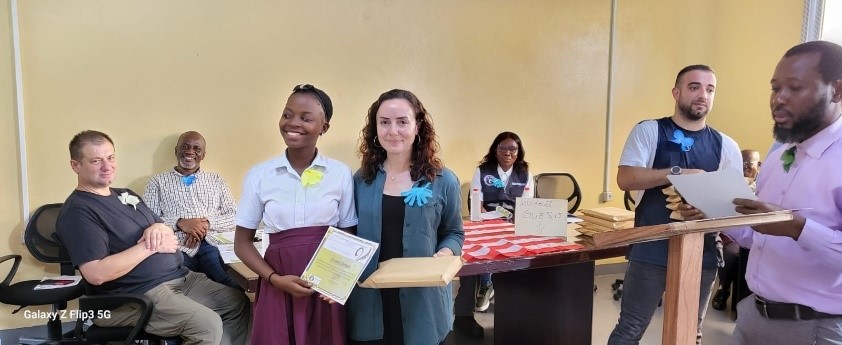Overlooking the beautiful and lush green landscape of Yekepa, atop the gigantic once dysfunctional waste treatment plant, an ArcelorMittal Liberia environmental team inspects finishing works on the plant.
A project, which has taken quite some time, is now almost completed, with the facility being made fully functional for the first time in over three decades since the civil war in Liberia.
This feat was only possible with the strong support of ArcelorMittal Liberia’s management and the commitment and teamwork of the Environmental Department and staff.
Outgoing Environmental Advisor, Hendrik Kuit, said completion of the rehabilitation of the Yekepa waste treatment plant was a major accomplishment of ArcelorMittal Liberia that will reduce the risk of environmental pollution and ensure proper management and control of waste, in compliance with national and international environmental laws.
Kuit said though challenging, the rehabilitation project was implemented in a way that saved cost but would produce maximum efficiency and performance as any other modern plant.
According to Kuit, it would have taken AML not less than $3 million to have a new plant to replace the old one, but through innovation and teamwork, the existing plant was rehabilitated and is already improving the environmental and sanitary conditions in Yekepa.
Kuit also acknowledged the roles of other individuals including John Teah of the AML Electrical Department, Rufus Dixon and Robert Siaway of the Engineering Department, Anthony Perry, and Cyrus Moore of Estates for their support in realizing the task of rehabilitating the plant.
The improvements at the facility include the installation of pumps to separate the water from the slush and other solid materials accompanying the water. The water is then sent to the filtering system from the chambers and filtered, while the slush goes to the drying bed where it will be processed into fertilizers. The filtered water is also chlorinated from the chlorine basin before being discharged out of the plant.
Further explaining the level of transformation that has taken place at the plant, Julia LuoyeaDolo, a young female supervisor at the plant said before the start of the rehabilitation work in 2019, the entire area was bushy and virtually dysfunctional.
Dolo said the sewage line from the Yekepa township to the plant was clogged, thereby causing spillage and emission of a foul odor in the environment.
However, Julia and her nine-member sanitation crew at the plant, ably by Environmental Advisor Hendrik Kuit were able to mitigate the environmental pollution.
“As a supervisor of this place, we encouraged people to work hard, and I am so grateful that they were able to work to get us to where we are. I did not work alone but with my co-workers, and we were able to come to this point,” Julia said, adding, “For now, we comply with the EPA standards unlike before when we were not, and I am really happy with the results we have now.”
Oliver Vaye, Environmental Officer for Monitoring and Compliance with expertise in Laboratory Chemistry is also proud of the level of control and compliance in place.
“We have our Total Suspended Solid monitoring program in place. We ensure in our work that we comply with the standard that EPA gave us. The filtering system out there has helped to optimize our filtering process, and we have been running a series of tests, and the results tell us that we are definitely in compliance,” said Oliver.
Meanwhile, Joseph Y. Kiadii, Environmental Officer for Waste Management said beyond the work on the waste plant, they have begun community sanitation programs to clean communities and ensure proper management and disposal of waste.







